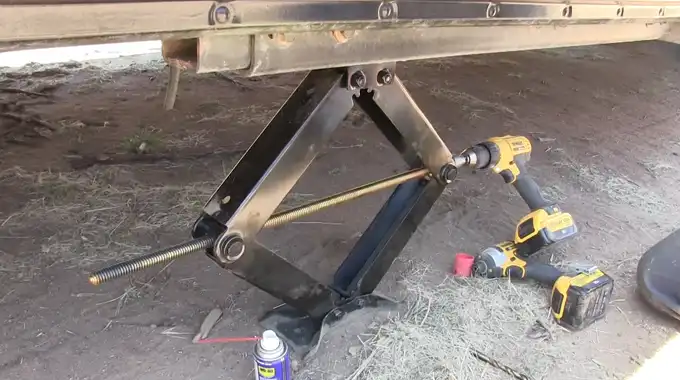Last Updated on April 19, 2023
Extending RV jacks is an integral part of setting up your RV for a camping trip for necessary support and stability. It’s important to understand how far to extend your jacks.
You should not extend your RV jacks fully because it can cause serious damage to the frame and jacks, as well as the potential for destabilizing or tipping over your RV. Only extend enough to take the weight off the suspension or until the “Out of Stroke” message appears on the screen.
Let’s explore the risks associated with the full extension of a certain object, how far it should be pushed for safe use, and examine safety precautions.
How Far Do RV Jacks Extend?
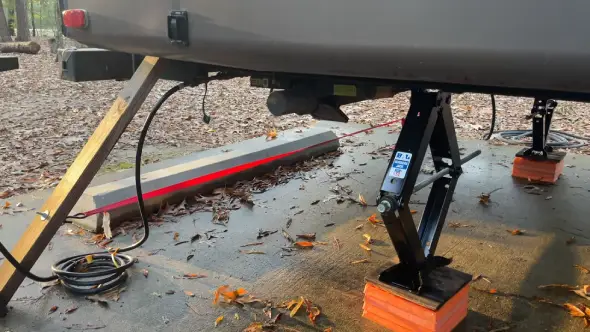
RV jacks are an essential part of RV maintenance and stability. There are two types of jacks: stabilizer jacks and leveling jacks. Stabilizer jacks provide a stable base for the RV while leveling jacks help to adjust the height of the vehicle to ensure a level surface when parked.
Most RV jacks extend up to around 12-20 inches, whereas the advertised extending height or maximum lift height has more range. However, some electric jacks may have a longer extension length, such as 30 inches or 49 Inches.
Generally speaking, it is important not to extend the jacks beyond their maximum lift Height, as this can cause damage to the suspension and create an unsafe situation. Extending the jacks enough should provide a stable foundation for your RV without causing any damage.
Going beyond this will result in an “Out of Stroke” message on display from most electric RV jack systems. By taking care not to exceed their limits, you can rest assured that your RV jack system provides secure and reliable support for your vehicle when needed.
The Risks of Fully Extending RV Jacks
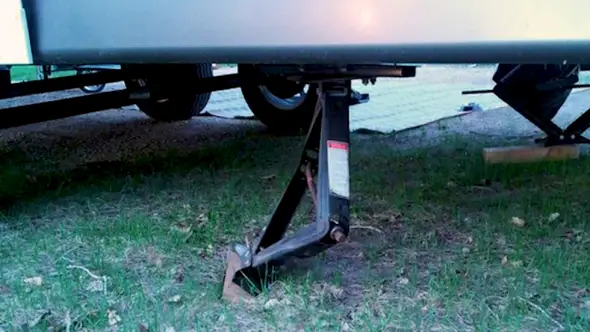
When considering the use of RV jacks to level an RV, it is important to understand the dangers involved with fully extending the jacks. Fully extending the jacks can result in uneven ground, increased stress on frames and jacks, risk of tipping or instability, and damage and wear of parts.
1: Limited Adjustability to Ground Irregularities
Fully extending RV jacks limits the ability of RV owners to adjust for ground irregularities. When the jacks are extended fully, any small bumps may cause them to rest unevenly on the ground instead of providing a level surface.
Additionally, if there are large rocks or other objects in the path of the jack legs, they could be damaged as a result of additional force needed to extend them further.
2: Stress on Jacks and Frame
Extending RV jacks too far can increase stress on both the RVs frame as well as on the jack itself. Increased stresses from fully extended RV jacks can lead to wear and tear over time if they remain extended for long periods of time.
It means there is a greater chance that they will need repairs or replacements sooner than a properly adjusted system would require.
3: Increased Risk of RV Tipping Over or Becoming Unstable
Extended RV jacks drastically increase the risk that an RV may tip over or become unstable while parked. Fully extended jacks provide much less support than partially extended ones because there is less area underneath where they meet with the ground.
Any imbalance has more movement and flexibility than normal before it reaches its tipping point. One side becomes unleveled due to ground irregularities or another factor, such as wind gusts.
This could quickly destabilize even a carefully balanced setup due to its limited support points, making it more susceptible to shifting forces.
4: Potential Damage and Wear on Parts Over Time
Continuously extending an RV’s jack legs while traveling on the roads can bring forth potential damage and accelerated wear over time. Wiring connected with these components may become disconnected due to the constant movement, introducing additional risks for drivers during their journey.
It is important to take extra precautions when driving advanced vehicles such as RVs in order to minimize potential damage and keep passengers safe.
Precautions to Take for Using RV Jacks
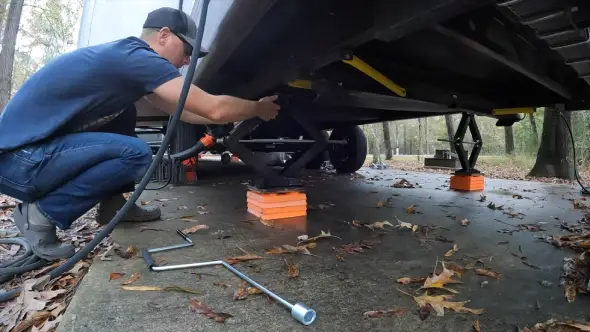
For using RV jacks, it is important to take a few precautions to ensure the safety of you and your rig.
1. Stable and Level Surface
When preparing to use an RV jack on a surface such as concrete or asphalt, ensure that the surface is stable and level before attempting to lift your rig off the ground. Uneven surfaces can cause instability which could lead to accidents or injuries when lifting with jacks.
Additionally, make sure there are no obstacles in the way of where you intend to place your jacks. This includes underground objects like sewer lines or tree roots that could potentially interfere with a stable setup.
2: Ensure Rated Jacks
When extending your jacks, ensure that they are rated for the specific type and weight of your RV. Different RVs require different types of jacks, so it is essential to know what kind of jacks your RV needs.
The weight of your RV will determine how powerful the jack needs to be in order to provide adequate support. Be sure to check with a professional if you’re unsure about the jack rating for your particular RV before extending it.
3. Only Extend Enough To Take Weight Off the Suspension
When extending RV jacks, make sure that the weight of the RV is taken off the suspension. To do this, extend the jack only enough until no weight remains on the suspension and all weight is on the jack itself.
Make sure to avoid over-extending as this could cause damage or hazardous situations. It is also important to be aware of your surroundings and not put any extra strain on your RV jacks by placing them on an unstable surface or uneven ground.
4. Use of Blocks and Other Leveling Aids
Using blocks or other leveling aids such as wood planks, can help ensure that all four corners of your vehicle are at even heights when lifting with jacks. Doing so will help provide more stability while lifting and will also prevent over-stressing any one corner of your rig, which could damage it further down the line.
When using blocks, be sure they are placed firmly against each corner of your vehicle, so they do not shift during lifting. Shifting can result in an unbalanced load that could cause an accident if not handled properly.
5. Equal Support
When setting up camp, make sure all four corners of your RV have equal levels of support before extending each side’s jack. This will help prevent uneven distribution of weight on one side which could cause harm to both people and property.
Ensure that all four jacks are firmly planted in the ground before applying force, as this will help keep them secure throughout the process.
6. Manufacturer Instructions
Always read and follow the owner’s manual and instructions and guidelines when using RV jacks, including checking for signs of wear and tear before each use. Inspect each manual jack for any cracks or deformities in order to ensure a safe experience while using them.
Also, make sure that all nuts, bolts, and other hardware are tightened properly before raising or lowering your RV with them; loose hardware can cause accidents or serious injury if not checked regularly.
7. Regular Inspections
Regularly inspecting your jacks’ condition is another key step when considering safety while extending them. Over time, different factors such as usage and environmental conditions can affect their performance and reliability.
So it is important to inspect them regularly for any signs of damage or wear and tear. Replace any components when necessary in order to keep them at top-notch condition and ensure optimum safety while using them.
Can You Use a Cordless Drill to Extend Your RV Jacks?
Upgrade your RV jack extension process with cordless drills that offer a drill and wrench combo. These modern power tools deliver the necessary torque to effortlessly raise jacks up, maximizing their potential height in minimal time.
In our review of the best cordless drill for RV jacks, we listed several key features that make these drills ideal for anyone looking to extend their RV jacks. These features include a lightweight design, high torque, long-lasting battery life, reversible speed, and ergonomic grip.
They are designed to provide maximum precision, for effortless extending and retracting jacks. Enjoy a stress-free getaway with these time-saving tools for ease on your adventure.
How Much Weight Can You Put On RV Jacks?
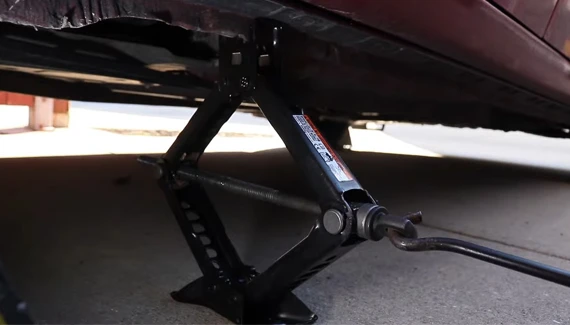
When determining how much weight RV jacks can support, one should consider several factors. Generally speaking, most leveling jacks have a weight capacity of between 2,500 to 5000 lbs. Some can take up to 6,500 lbs for strong alloy steel materials.
This weight capacity can depend on the size and type of jack in use: smaller auto or manual jacks may be able to hold less weight, while larger jacks can support more.
Since most RVs will typically make use of all four jacks to support their total load capacity, it’s important that they equally share the burden. Too much weight on one hydraulic jack precludes it from bearing its fair share of the load.
Consequently, if one scissor jack fails, the remaining three must pick up the slack. Fortunately, with an average load capacity of 5,000 lbs per four jacks combined, this amount is generally enough to accommodate most RVs’ total weight.
Are RV Wheels Off the Ground When Extending Jacks?
Many people believe that RV wheels must be lifted off the ground to extend the RV jacks, but this is not the case. Most RV leveling systems are designed to level the RV by lifting the chassis off the ground rather than lifting the wheels.
This helps to distribute the weight of the RV more evenly and prevents damage to the tires and wheels. Even so, some people choose to lift their RV’s wheels when they extend their jacks. While this may seem like a good way to level the RV, fifth wheel, or travel trailer, it can actually cause damage to the leveling system.
When you lift the wheels off the ground, the weight of the RV is no longer evenly distributed, and this can put a strain on the jacks and other parts of the leveling system. It is also possible for tires and wheels to wear prematurely when wheels are lifted off the ground.
Due to these reasons, your RV’s wheels should not be lifted off the ground when you extend your jacks.
Why Do RVers Put Blocks Under RV Jacks?
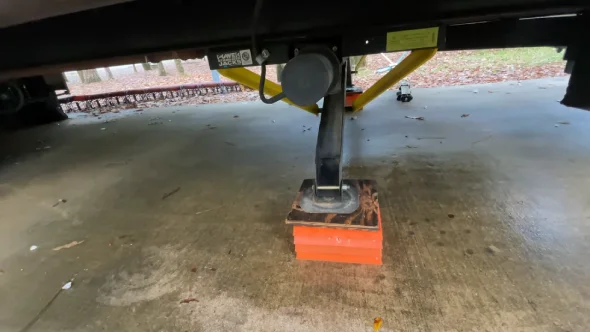
Placing blocks of wood or plastic beneath RV leveling jacks is a common practice for many people due to the convenience and safety offered. Preventing the stabilizer jacks from extending too far allows you to secure your RV better while also helping to level it out with simple adjustments.
Not only does this make your RV stay more balanced and save energy, but it can be a safety measure. If a jack stand were to slip or break while extended, you would be more likely to incur serious damage than if it was at a more modest length.
As it stands, ensuring that your leveling jacks with blocks of wood or plastic can be an effective way of protecting and stabilizing your RV, potentially saving you hundreds or thousands in repair costs.
Are Jack Pads Necessary When Extending RV Jacks?
While jack pads are not strictly necessary, they can offer several benefits that make the process easier and safer. Jack pads help to stabilize the jacks, preventing them from sinking into soft soils or shifting on uneven ground. It is especially important if the leveling jacks are extended to their maximum height.
And RV stabilizer jack pads can help to protect the jacks from damage. They can minimize deterioration by providing a buffer between the ground and the jacks. Therefore, jack pads can prolong the life of your RV jacks. While they are not absolutely essential, stabilizing jack pads can be a worthwhile investment.
Ensure a Stable and Secure Setup When Extending RV Jacks
Weigh the risks associated with fully extending your RV jacks when deciding whether or not to use them. While fully extending the RV jacks may seem like a good idea, these actions could result in undue strain on the frame and parts, which in turn can cause the unit to be unstable or even tip over.
It is best practice to only extend them enough so as to take the weight off of your vehicle suspension. Manufacturers often provide instructions for their use, including instructions for leveling aids such as blocks or other supports.
Ultimately, thoughtful consideration should be given before opting to fully extend your RV jacks.
